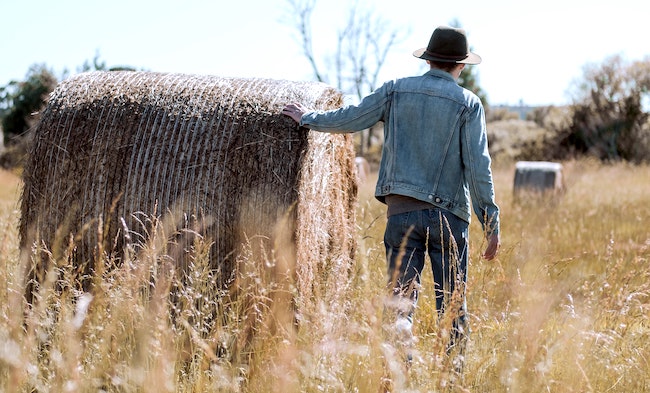
This week we read the double parsha of B’har-B’chukosoi. B’har begins with the laws pertaining to shmitah — the seventh year serving as a sabbatical year. “Va’y’dabare Hashem el Moshe b’Har Sinai laimore… v’shavsa ha’aretz Shabbos la’Hashem (And Hashem spoke to Moshe at Mount Sinai saying… the land shall rest as a Sabbatical to Hashem) [25:1-2].”
Since all of the mitzvos were commanded at Sinai, why does the Torah specifically connect the mitzva of shmitah to Sinai? Rashi explains in the following manner. The details of many of the mitzvos were elaborated upon later at arvos Moav (the plains of Moav). (They comprise a substantial part of Sefer Devarim – Deuteronomy.) The mitzvah of shmitah is one of those which were not elaborated upon later at arvos Moav. Therefore, by this mitzva it is clear that all of its details were given at Sinai. Shmitah then reflects upon all of the mitzvos, even those which were mentioned at arvos Moav, showing that they too were given in their entirety at Sinai. At arvos Moav there was only a repetition of that which had already been taught at Sinai.
The Chasam Sofer explains why, of all of the mitzvos not repeated at arvos Moav, shmitah was chosen to show that all aspects of all mitzvos were taught at Sinai.
There are certain mitzvos that are undeniably of Divine origin. If a person was trying to `ghost-write’ a Torah and pass it off as being from Hashem, he would not include any difficult guarantees that would be beyond his control to fulfill. This would ultimately destroy any credibility that might have been established.
Imagine a person writing a Torah and putting in this verse: “And when you’ll say: What will we eat on the seventh year? And I will command My blessing on the sixth year and it will give forth enough produce to sustain you for three years [25:20-21].” You will, will you!? Anyone want to try that themselves? How long would such a religion last? Smart money says less than seven years…
Shmitah is clearly from Sinai — of Divine origin. It then reflects upon all of the mitzvos contained in that same Torah, even those whose Divine origin is not self evident, that they were all given, in their entirety, at Sinai.
Shmitah contains many lessons for us. In addition to the obvious bitachon (trust) that it builds in a person, the Olas Tamid writes that it also helps to establish a sense of achdus (unity) amongst Klal Yisroel. We all began as one neshama that was contained within Adom Harishon. In order to help us retain this unity we were given many mitzvos of helping one another. Shmitah is one of these mitzvos.
We often have the attitude that what’s mine is mine and what’s yours is yours. If I’ve worked hard and become successful in life, then why should I share that with you?
During shmitah, all of our fruits become hefker (ownerless). This drives home the point that what is mine really isn’t mine! The world belongs to Hashem. He has blessed us with certain things in order to give us the opportunity to use them correctly. If these blessings make us haughty, then we are missing the point and we are certainly in danger of having these blessings transferred to a more responsible caretaker. We can be compared to a bank teller who, with millions passing through his hands daily, begins to have delusions that he’s really quite wealthy. When this attitude leads him to `mouth off’ to his supervisors when they have the audacity to ask him to do something, he quickly finds himself looking for another job.
We must appreciate our blessings and use them wisely, being that we never really know why we were given what we have…
Rabbi Abraham Twerski tells the story of a person who approached the Baal Shem Tov. He was a wealthy man and hadn’t come to ask for anything — he just wanted to meet the renowned Tzaddik. The Baal Shem Tov asked him to listen very carefully to a story that he wanted to tell him.
“There were once two young boys, Chaim and Boruch, who lived very close to one another, attended the same school, and became extremely close friends. The two were inseparable as they and their friendship progressed through the teenage years into early adulthood.
“When they married, each moved to their wife’s hometown and for the first time that they could remember, they were separated. They pledged to remain friends for eternity and they kept in close contact through letters. As time passed and their families and responsibilities grew, the communication gradually slowed down until it ultimately had stopped completely.
“Each went into business and did well. However, life is often a cycle, and Boruch who had been at the top of his business fell to the very bottom. He eventually became penniless. Thinking that perhaps, his friend Chaim would help him, he borrowed travel money and went to Chaim’s town. When Chaim saw his old friend, he embraced him and the two spoke for hours. When Boruch got up the courage and told Chaim about his sorry state of affairs, Chaim didn’t waste a moment. He summoned his accountant and had him tally all of his assets. He immediately wrote a check, giving half of all of his worth to his friend Boruch. Boruch, with tears of joy and thanks, returned home.
“With money to invest, Boruch rebuilt his business and once again became wealthy. However, as Boruch’s wheel of fortune ascended, Chaim’s descended. Chaim quickly became impoverished. Remembering his good friend that he had helped so generously, Chaim traveled to see Boruch. Boruch, however, showed a very different attitude. `Chaim, there is a very clear pattern here. We can’t both be prosperous. Either you succeed while I suffer or I succeed while you suffer. If I help you, I’ll lose everything. Even if I’d be willing to do that for you, I have a responsibility to my wife and children. I’m very sorry but I can’t help you.’ Chaim returned home empty handed and broken hearted.
“Years passed and both Chaim and Boruch left this world. When they came before the heavenly court, Chaim was allowed entry to Gan Eden (paradise) for the kindness he had shown to Boruch. Boruch, for turning his back on his friend, was being placed in a different `department’. Chaim then proclaimed: `How can I enjoy Gan Eden when my friend Boruch is suffering? True, he might have failed his test, but I refuse to enter Gan Eden without my friend Boruch!'”
At this point the Baal Shem Tov told the man to listen very carefully and to look him in the eye.
“There was a heavenly uproar. Allowing Boruch into Gan Eden was impossible, yet Chaim refused to enter without him. The court decided on the following solution. Both souls would be sent back to this world. Boruch’s would be rich and Chaim’s would be a pauper. If this time Boruch would help Chaim, then the sin would be rectified and Boruch would be allowed to ultimately join Chaim in Gan Eden.
“The person bearing Chaim’s soul became a pauper who survived on alms. He’d keep just pennies for himself and gave the rest to support his wife and small children. The person bearing Boruch’s soul became extremely wealthy.
“One day, the weary pauper made his way to the wealthy man’s town. Tired, hungry and depressed, he felt he hadn’t the strength to continue. Perhaps someone would give him more than a few pennies and he’d be able to take care of his family. Winter was approaching and his children needed shoes and warm clothing. If only he could speak to a wealthy man in person, perhaps he would give generously and allow him to meet his family’s needs.
“The beggar knocked on a wealthy man’s door and was met by the butler who gave him a few pennies. `Please, let me speak to your master for just a few moments’, he begged. The butler explained that his master was far too busy to meet with him. The beggar began to cry, `please, ask him to have mercy and grant me just a few moments’.
“At this point, the wealthy man heard the commotion and asked the butler what the problem was. He explained that a stubborn beggar wouldn’t accept the alms he had given him and was demanding to meet with the master personally. The wealthy man became furious. `The audacity! If he refuses to leave, throw him out!’ The butler, heeding his master, literally threw the pauper down the stairs. Exhausted, famished and humiliated, the beggar breathed his last breath and his soul returned to the heavens.
As the Baal Shem Tov finished his story, the wealthy man became to cry. “That is what happened to me just last week! How was I to know? How was I to know!”
The Baal Shem Tov continued. “You had the opportunity to correct your sin. Had you met with him and listened, perhaps his words would have pierced your heart. You would have repaid that debt of long ago… Now, you still can redeem yourself. Leave only enough for the necessities of life for you and your family. The rest of your wealth must be given to the beggar’s widow and orphans.”
Shmitah. Achdus (unity). We must appreciate our blessings and use them wisely, being that we never really know why we were given what we have…
Chazak, chazak v’nischazek.
Good Shabbos.
Yisroel Ciner
Copyright © 1998 by Rabbi Yisroel Ciner and Project Genesis, Inc.
The author teaches at Neveh Tzion in Telzstone (near Yerushalayim).


